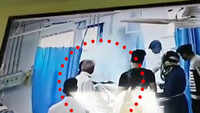
Coimbatore: The Coimbatore Medical College Hospital (CMCH) has managed to reduce maternal deaths by 12% to 47 last year from 54 in 2017. This is the lowest number of maternal mortality rate recorded in the hospital in the past five years.
Hospital authorities said they managed to achieve this feat by consciously increasing the number of senior staff on duty and acquiring more diagnostic equipment.
Data with CMCH, the tertiary care hospital for the entire western region, shows that the number of maternal deaths, which marginally increased in 2017 due to more admissions and deliveries, fell sharply in 2018. The hospital recorded 52 deaths in 2015, 53 in 2016 and 54 in 2017. However, the number dropped to 47 last year.
It is to be noted that the number of deliveries has steadily been increasing in the hospital. The hospital, which had just 6,000 deliveries in 2015, performed 8,227 deliveries last year.
According to the hospital authorities, of the 47 deaths, in at least 10-15 cases patients were either brought dead or shifted to the hospital in critical conditions. “They were not regular patients of the hospital. They developed complications in private hospitals and were either brought dead or in extremely critical conditions after a lot of blood loss,” said Dr B Ashokan, hospital dean.
He also enumerated various steps taken by them to bring down the maternal mortality rate in the hospital. “We started posting two senior obstetricians in each shift, instead of one person earlier. Each shift sees 25 to 30 deliveries, of which 50% would be C-section and the other 50% normal deliveries. Though one doctor would manage everything with the help of PG students, it is still too difficult,” the dean said. “Hence, we placed two senior obstetrics in each shift, so one can remain in the delivery ward and the other in the operating theatre to manage C-sections.”
High-risk deliveries from hill stations or outside districts are now given priority and made to get admitted well before their due date, said another official. “The number of ultrasound machines has gone up by 50% to 30 from 20. So, we get to do last minute scans immediately to take an informed decision. Number of NST machines has also shot to three from one,” said Dr Manonmani, the hospital’s head of gynecology and obstetrics department.
Dr Ashokan said they also ensure that the blood bank has at least 1,000 units of blood ready for transfer, including that of rare blood groups. “We have components of blood like platelets and packed cells, so we can give patients what they exactly need.”
The state government’s health department also achieved the record lowest maternal mortality rate in a decade at 60 deaths per 1,000 last year. The state was placed third behind Kerala and Maharashtra.
Hospital authorities said they managed to achieve this feat by consciously increasing the number of senior staff on duty and acquiring more diagnostic equipment.
Data with CMCH, the tertiary care hospital for the entire western region, shows that the number of maternal deaths, which marginally increased in 2017 due to more admissions and deliveries, fell sharply in 2018. The hospital recorded 52 deaths in 2015, 53 in 2016 and 54 in 2017. However, the number dropped to 47 last year.
It is to be noted that the number of deliveries has steadily been increasing in the hospital. The hospital, which had just 6,000 deliveries in 2015, performed 8,227 deliveries last year.
According to the hospital authorities, of the 47 deaths, in at least 10-15 cases patients were either brought dead or shifted to the hospital in critical conditions. “They were not regular patients of the hospital. They developed complications in private hospitals and were either brought dead or in extremely critical conditions after a lot of blood loss,” said Dr B Ashokan, hospital dean.
He also enumerated various steps taken by them to bring down the maternal mortality rate in the hospital. “We started posting two senior obstetricians in each shift, instead of one person earlier. Each shift sees 25 to 30 deliveries, of which 50% would be C-section and the other 50% normal deliveries. Though one doctor would manage everything with the help of PG students, it is still too difficult,” the dean said. “Hence, we placed two senior obstetrics in each shift, so one can remain in the delivery ward and the other in the operating theatre to manage C-sections.”
High-risk deliveries from hill stations or outside districts are now given priority and made to get admitted well before their due date, said another official. “The number of ultrasound machines has gone up by 50% to 30 from 20. So, we get to do last minute scans immediately to take an informed decision. Number of NST machines has also shot to three from one,” said Dr Manonmani, the hospital’s head of gynecology and obstetrics department.
Dr Ashokan said they also ensure that the blood bank has at least 1,000 units of blood ready for transfer, including that of rare blood groups. “We have components of blood like platelets and packed cells, so we can give patients what they exactly need.”
The state government’s health department also achieved the record lowest maternal mortality rate in a decade at 60 deaths per 1,000 last year. The state was placed third behind Kerala and Maharashtra.
Make sense of the 2019 Lok Sabha elections and results on May 23 with TOI. Follow us to track latest news, live updates, news analysis and cutting-edge data analytics. Track live election results, the big trends and fastest updates on counting day with India's largest news network.
#ElectionsWithTimes
Quick Links
Lok Sabha Election Schedule 2019Lok Sabha Election NewsDelhi Capitals teamMI team 2019Rajasthan Royals 2019RCB team 2019Maharashtra Lok Sabha ConstituenciesBJP Candidate ListBJP List 2019 TamilnaduShiv Sena List 2019AP BJP List 2019Mamata BanerjeeBJP List 2019 MaharashtraPriyanka GandhiBJP List 2019 KarnatakaAMMK Candidate List 2019BJP List 2019 WBLok Sabha Elections in Tamil NaduBSP List 2019 UPNews in TamilLok Sabha Poll 2019Satta Matka 2018PM ModiMahagathbandhanNagpur BJP Candidate ListChandrababu NaiduTamil Nadu ElectionsUrmila MatondkarNews in TeluguMadras High CourtTejashwi YadavArvind KejriwalTejasvi SuryaPawan KalyanArvind KejriwalYogi AdityanathJaya PradaSatta King 2019Srinagar encounter
Get the app









